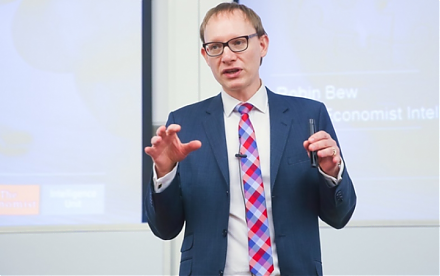

2023-06-14 10:26:00 Wed ET
stock market federal reserve monetary policy treasury fiscal policy deficit debt technology covid-19 employment inflation global macro outlook interest rate fiscal stimulus economic growth central bank fomc capital global financial cycle gdp output
Daron Acemoglu and James Robinson (2013)
Why nations fail: the origins of power, prosperity, and poverty
Daron Acemoglu and James Robinson empirically show that inclusive institutions help contribute to better national performance in terms of economic growth, health care, life expectancy, and other sustainable development goals. Key cross-country regressions suggest that successful economic development often depends on the broader state capacity for fiscal stimulus, effective rule of law, and political conflict resolution. Acemoglu and Robinson organize an impressive variety of case studies in support of the main thesis that inclusive institutions can cause state choices and decisions in favor of economic growth. At the same time, Acemoglu and Robinson indicate that extractive institutions often enrich dictators, politicians, and other state decision-makers at the expense of economic growth. In economic history, the wise choice between inclusive and extractive institutions often turns out to be the major ingredient for economic growth and prosperity. Acemoglu and Robinson also argue that there is a fair bit of serendipity in the positive selection of effective institutions. For this reason, most countries cannot emulate core public policies and institutions in order to engineer economic growth and prosperity in the long run.
Acemoglu and Robinson emphasize the importance of political clout and power in enhancing national economic growth and performance. In some nations, the rather unfortunate concentration of power in the hands of the few elites and even dictators inhibits the economic success of nations in a wide variety of situations in economic history. Political power is quite important for the fair and efficient allocation of core resources in the modern capitalist society. The Coase (1960) theorem states that the initial allocation of private property rights, as well as the debt liabilities from tort law, should have no effect on free market efficiency in the absence of transaction costs. The initial concentration of power may affect the fair distribution of resources in our modern society, but this concentration cannot necessarily suggest economic waste (nor slow economic growth). The recent evolution of macroeconomic school of thought shows the conflict resolution of the free market and socialist economies. Most modern capitalist societies can achieve high economic growth with no or little effect on economic equality and distributive justice.
The fair allocation of power has efficiency implications for at least 2 main reasons. First, most large complex economies decentralize information asymmetries. From time to time, the government needs to induce each economic actor to reveal his or her private information about tastes, beliefs, and preferences. Second, it is difficult for the government to incentivize all economic actors to reveal private information. Sometimes it is not possible for the government to anticipate all sorts of information asymmetries, incomplete markets, vague contracts, and tacit knowledge transfers etc. This view can explain why some effective business organizations and nations can often help carefully distribute cash flow control rights in corporate governance. One size often cannot fit all, and there can be several different ways for one to skin the cat. When push comes to shove, the baseline law of inadvertent consequences counsels caution.
Acemoglu and Robinson advocate that nations with inclusive institutions often tend to attain higher long-term economic growth than nations with extractive institutions. Inclusive economic institutions, such as those economic institutions in America and South Korea, allow and encourage participation by the great mass of people in key economic activities that can make the best use of their talents and skills. Inclusive institutions empower citizens and residents to make their free choices in economic matters. To be inclusive, economic institutions feature secure private property, rule of law, and the provision of essential public services on a level playing field. These inclusive institutions allow people to contract in exchange for goods and services. Further, these inclusive institutions permit the entry of new businesses for people to choose their own careers and lifestyles. In essence, inclusive institutions seem to epitomize the good society of free market capitalism.
Acemoglu and Robinson argue that nations fail when they are built upon extractive institutions. Extractive political institutions concentrate power in the hands of a few elites and then place few constraints on the use of this power. Extractive economic institutions often help the upper social echelon extract rare resources from the rest of society. These extractive economic and political institutions can often empower dictators, politicians, and other rent-seekers to entrench their social status, power, and money. Through extractive institutions, family and state enterprises can often transmit their social and economic privileges and advantages from one generation to the future generations. Hereditary economic inequality arises as a natural result of this pervasive trend worldwide. To the extent that elites often derive high returns on their capital but not hard labor, both wealth and income inequality would seem to persist as a suboptimal outcome in many rich and poor countries.
Acemoglu and Robinson point to the city of Nogales that straddles the American-Mexican border. A small change in the location of an individual household (i.e. U.S. Nogales versus Mexican Nogales) can result in a large change in many economic life outcomes. Regression discontinuity design shows that economic productivity often depends on physical location. Mass production in close locations in principle have similar natural resources and endowments. If geography is key to economic development, people in both halves of Nogales should have similar life outcomes. However, the experiment indicates that both the economic and political institutions on each side of the barrier are quite different, so the observable large differences in life outcomes (in terms of both economic productivity and worker welfare) should result from the different institutions but not geographic endowments. Furthermore, Acemoglu and Robinson go through a long sequence of historical case studies of good institutions and economic results such as Jamestown in the sixteenth century, the Glorious Revolution in England, and post-war South Korea etc. Acemoglu and Robinson compare and contrast these positive case studies with several examples of poor institutions and economic results such as modern Congo and North Korea. In this fresh light, nationwide institutions matter much more than natural resources and geographic endowments in explaining cross-country differences in economic growth, productivity, health care, life expectancy, worker welfare, and several other sustainable development goals.
Acemoglu and Robinson indicate that the nation suffers from extractive institutions when a small group of elites, politicians, and state decision-makers can retain core political control rights. In stark contrast, the nation can enjoy high economic growth, productivity, worker welfare, and sustainable development when the median-voter preferences of residents constrain political control rights with checks and balances in the broader context of good inclusive institutions. Acemoglu and Robinson view human behaviors as natural responses to economic incentives. Most people care about their rare, valuable, and inimitable organizational resources, take actions to increase these resources, and then strive to protect these resources in hand. From the bubonic plague and the discovery of America to the Industrial Revolution, good inclusive institutions encourage people to take actions that benefit all of the fellow citizens with sound private property rights.
The government often choose to invest in fiscal capacity and law enforcement in order to fund social welfare transfers and public goods. In this unique fashion, more productive economies tend to invest more in both fiscal and legal capacity in most common-interest and redistributive states (than in less cohesive states). Therefore, many macro economists often focus on the positive correlation between inclusive institutions and quality-of-life outcomes. In a similar vein, many macro economists empirically report a positive correlation between common law origin and economic growth. Although correlation cannot imply causation all the time, this econometric evidence shines fresh light on macro institutional arrangements and life outcomes worldwide.
With their focus on inclusive versus extractive institutions, Acemoglu and Robinson suggest that national economic growth can become better when elites and citizens share political clout and bargaining power. This delicate balance tends to be vitally important in most modern democratic capitalist societies. There are at least 2 wider contexts in support of the fair and important allocation of political bargaining power. First, elites and citizens often confront substantial information asymmetries. State decision-makers help reduce these information asymmetries by promoting greater transparency in the fair and open election of public bureaucrats, legislators, as well as presidential candidates etc. This transparency helps connect the dots between public policies and constituent interests. Second, available contractual instruments are often incomplete, so some elites and citizens cannot capture the future returns from their capital investments. When elites exploit extractive institutions to capture economic rent from many citizens, the political power unfortunately tilts toward the upper social echelon. Moreover, family and state enterprises may advertently use their economic privileges and advantages to entrench managerial interests. In this specific context, most economies would be better off if their state decision-makers reconsider the optimal design of good inclusive institutions to ensure broader and better citizen participation in public policies and distributive social welfare transfers. On balance, key state decision-makers must better balance the political bargaining power between elites and citizens in order to enhance economic growth and many other sustainable development goals.
In the corporate context, control rights empower state and family elites to steer the major business decisions such as mergers and acquisitions, capital expenditures, capital structure choices, dividend distributions, and share repurchases etc to the detriment of minority shareholders and outside blockholders. These control rights often exclude minority shareholders from the effective control and management of public corporations. Legislators and other incumbent state decision-makers should launch corporate governance reforms to prevent inside blockholders from abusing their large equity stakes and control rights in public corporations at the expense of most minority shareholders and outside blockholders. In accordance with the main thesis by Acemoglu and Robinson, the political economy case studies provide new economic insights into the socially desirable design of corporate control schemes. The macro political economy case studies hence have in-depth policy implications for micro matters in corporate governance. Overall, Acemoglu and Robinson strive to emphasize the vital importance of good inclusive institutions for most nations or corporations to attain higher economic growth, better health care, longer longevity, and many other sustainable development goals.
State decision-makers often cannot choose more effective inclusive institutions as these politicians, bureaucrats, and legislators etc cannot share in the new benefits such as greater wealth and income. Some of the state decision-makers have made specific capital investments in technological advances and disruptive innovations, but these state decision-makers would receive low returns under the new inclusive institutions. In accordance with the classic economic notion of creative destruction by Joseph Schumpeter, structural changes and reforms may inadvertently lead to the irreparable loss of economic welfare for some elites and citizens when the new incumbents direct rare, valuable, and inimitable organizational resources into more effective uses and applications in other sectors. For instance, the recent structural transformation from agricultural and manufacturing jobs to services represents the mega trend in many countries. However, this structural transformation directs high-skill human capital into knowledge-intensive services with robotic automation and artificial intelligence (in stark contrast to labor-intensive jobs in the agricultural and manufacturing sectors). This structural transformation accords with the economic concept of creative destruction by Joseph Schumpeter. To the extent that several modern technological advances can disrupt the entire sectors of trade and finance, disruptive innovations often can create high-skill jobs that entail domain knowledge with subject matter expertise. In this fresh light, state decision-makers often cannot anticipate the public policy implications of Schumpeter disruptive innovations with respect to many advances in trade, finance, medicine, and information technology. State decision-makers often cannot choose more effective inclusive institutions as these politicians and legislators cannot share in the new economic benefits.
In accordance with what Acemoglu and Robinson would cite as an example of an improvement in inclusive political institutions, the Glorious Revolution in England back in 1688 marked a historical episode of power shifting from the monarch to the state. This structural shift allowed for more democratic participation in government. During this historical episode, the Whigs had the upper hand and used this political advantage to increase their ability to raise taxes. The Whigs further improved the protection of private property. This protection led to a substantive improvement in economic performance and ultimately the Industrial Revolution.
Political institutions often play at least 2 important roles in economic development. First, political leaders create their world vision for others to follow. Democratic rule of law facilitates greater voter participation in public affairs. Incumbents help design better public policies in accordance with constituent interests. In a unique fashion, these inclusive political institutions can contribute to better economic development in the long run. Second, inclusive political institutions provide many ways for voters, citizens, and special interest groups to express their private concerns and interests to state decision-makers. This bilateral communication mechanism ensures better public policies and state decisions over time. In due course, these public policies and reforms help enrich the economic lives of voters, citizens, and special interest groups. Overall, these inclusive political institutions help improve social economic development in terms of higher economic growth, better public health care, longer life expectancy, less environmental degradation, and numerous other sustainable development goals.
In terms of causal inferences, Acemoglu and Robinson argue that a major change from extractive to inclusive institutions often leads to better economic performance. An impressive set of historical case studies can serve as substantive evidence in support of this specific causal statement by Acemoglu and Robinson. With the core focus on actual historical events, economists present persuasive narrative stories that allow the non-technical reader to see the central economic life outcomes as a result of inclusive institutions. Sometimes it is easier for economists and politicians to draw causal inferences on the basis of historical facts worldwide.
In the Nogales example, for instance, location is the background variable. This key example satisfies the essential conditions for valid regression discontinuity design. First, the climate and agricultural conditions are highly similar on both sides of the border. Thus, local physical endowments are similar on both sides of the Mexican-American border. Second, residents are not free to move across the border. Hence, these residents face low mobility due to different human institutions on each side. As the U.S. side is much more economically successful than the Mexican side, one can conclude that American inclusive institutions cause U.S. Nogales residents to be much better off than Mexican Nogales residents. Mexico is a young democracy, and its citizens have the basic right leave at will. However, the U.S. does not allow free entry subject to strict immigration laws and regulations. America has a strong exclusive institution that constrains the rights of other residents worldwide to share the U.S. good economic fortune. The law enforcement of property rights is a major ingredient in the modern capitalist society. This enforcement entails the basic right for the government to exclude others from entering the state. In this light, exclusive institutions from immigration laws to antitrust regulations restrict the wide gamut of inclusive economic and political institutions. For this reason, most countries cannot simply emulate inclusive institutions in America, Britain, Canada, and Europe etc in order to achieve greater economic growth, higher national income, better health care, longer longevity, and many other sustainable development goals.
The modern study of business organizations shines new light on the important role of inclusive institutions in long-term economic development. From time to time, key economic performance relies on many interdependent factors. This plurality issue helps analyze what works well in the presence of complements. The modern study of business organizations shows that historic experimentation alone cannot suffice to discover the best design for complex systems. There are many complementary ways for state decision-makers, politicians, and legislators to pull together complex national organizations. In some cases, this endeavor requires using more inclusive economic and political institutions. Acemoglu and Robinson provides evidence in support of the positive correlation between inclusive institutions and economic life outcomes. Inclusive institutions alone are neither necessary nor sufficient for good economic performance. In the in-depth economic study of business organizations, incentive contracts are often so complex that small information asymmetries result in substantial changes in observable human behaviors and even market failures in the presence of product quality heterogeneity. In the Akerlof seminal study of the market for lemons (or second-hand cars), this ubiquitous phenomenon of adverse selection affects the overall efficiency of both business and national organizations. When push comes to shove, the basic law of inadvertent consequences counsels caution.
Acemoglu and Robinson present their core model of rational human behaviors. In this core model, most economic actors respond to material rewards and incentives. Acemoglu and Robinson illustrate how the core model has come to dominate the essential way we mull over inclusive institutions in the broader context of long-term economic growth and performance. The most important economic insight pertains to the conditional nature of private property rights. In all political systems, the state government has law enforcement and control rights that individual citizens cannot exercise at will. As Acemoglu and Robinson suggest in their main thesis, the vast majority of successful human institutions delegate control rights to voters, citizens, and special interest groups with the optimal incentives and information advantages. In effect, these incentives and information advantages help state decision-makers better manage public affairs in accordance with constituent interests.
In civil society, many mechanisms can help delegate control rights. Within the firm, for instance, the rule of forbearance gives the owner all residual control rights. Tort law gives basic rights to people to recover damages when these people experience economic harm due to the negligent behaviors of others. Contract law gives people basic rights to launch lawsuits when there is a breach of contract. Further, business law gives corporations basic rights to sue directors and senior managers if there is a breach of duty of care, loyalty, and good faith etc. In a similar manner, democracy gives citizens basic rights to change their state decision-makers and legislators etc. Citizens apply these conditional extractive rights to support specific parties. Parties retain state control rights. With these control rights, specific parties can choose to perform whatever they wish in accordance with constituent interests (subject to the possibility that citizens can eventually revoke these control rights).
A central unique feature of successful civil societies is the basic right of citizens to bring actions in court against others for different harms. In a global world economy, it would be practical for people to know more about the role of international courts that allow citizens of any nation to bring a variety of actions against others in their home state. These cases can involve human rights violations and the expropriation of resources. Even though we cannot make a particular nation more inclusive, it is possible for most state decision-makers to make the legal system more inclusive. Although most countries cannot simply emulate good inclusive institutions in order to achieve better economic growth, global citizens can still benefit from the gradual progression toward inclusive institutions worldwide.
This analytic essay cannot constitute any form of financial advice, analyst opinion, recommendation, or endorsement. We refrain from engaging in financial advisory services, and we seek to offer our analytic insights into the latest economic trends, stock market topics, investment memes, personal finance tools, and other self-help inspirations. Our proprietary alpha investment algorithmic system helps enrich our AYA fintech network platform as a new social community for stock market investors: https://ayafintech.network.
We share and circulate these informative posts and essays with hyperlinks through our blogs, podcasts, emails, social media channels, and patent specifications. Our goal is to help promote better financial literacy, inclusion, and freedom of the global general public. While we make a conscious effort to optimize our global reach, this optimization retains our current focus on the American stock market.
This free ebook, AYA Analytica, shares new economic insights, investment memes, and stock portfolio strategies through both blog posts and patent specifications on our AYA fintech network platform. AYA fintech network platform is every investor's social toolkit for profitable investment management. We can help empower stock market investors through technology, education, and social integration.
We hope you enjoy the substantive content of this essay! AYA!
Andy Yeh
Chief Financial Architect (CFA) and Financial Risk Manager (FRM)
Brass Ring International Density Enterprise (BRIDE) ©
Do you find it difficult to beat the long-term average 11% stock market return?
It took us 20+ years to design a new profitable algorithmic asset investment model and its attendant proprietary software technology with fintech patent protection in 2+ years. AYA fintech network platform serves as everyone's first aid for his or her personal stock investment portfolio. Our proprietary software technology allows each investor to leverage fintech intelligence and information without exorbitant time commitment. Our dynamic conditional alpha analysis boosts the typical win rate from 70% to 90%+.
Our new alpha model empowers members to be a wiser stock market investor with profitable alpha signals! The proprietary quantitative analysis applies the collective wisdom of Warren Buffett, George Soros, Carl Icahn, Mark Cuban, Tony Robbins, and Nobel Laureates in finance such as Robert Engle, Eugene Fama, Lars Hansen, Robert Lucas, Robert Merton, Edward Prescott, Thomas Sargent, William Sharpe, Robert Shiller, and Christopher Sims.
Follow our Brass Ring Facebook to learn more about the latest financial news and fantastic stock investment ideas: http://www.facebook.com/brassring2013.
Follow AYA Analytica financial health memo (FHM) podcast channel on YouTube: https://www.youtube.com/channel/UCvntmnacYyCmVyQ-c_qjyyQ
Free signup for stock signals: https://ayafintech.network
Mission on profitable signals: https://ayafintech.network/mission.php
Model technical descriptions: https://ayafintech.network/model.php
Blog on stock alpha signals: https://ayafintech.network/blog.php
Freemium base pricing plans: https://ayafintech.network/freemium.php
Signup for periodic updates: https://ayafintech.network/signup.php
Login for freemium benefits: https://ayafintech.network/login.php
If any of our AYA Analytica financial health memos (FHM), blog posts, ebooks, newsletters, and notifications etc, or any other form of online content curation, involves potential copyright concerns, please feel free to contact us at service@ayafintech.network so that we can remove relevant content in response to any such request within a reasonable time frame.
2018-06-06 09:39:00 Wednesday ET

Donald Trump and Kim Jong Un meet, talk, and shake hands in the historic peace summit between America and North Korea in Singapore. At the start of the bila
2019-02-15 11:33:00 Friday ET

President Trump is open to extending the March 2019 deadline for raising tariffs on Chinese imports if both sides are close to mutual agreement. These bilat
2019-06-13 10:26:00 Thursday ET

The Chinese Xi administration may choose to leverage its state dominance of rare-earth elements to better balance the current Sino-U.S. trade war. In recent
2019-01-11 10:33:00 Friday ET

The Economist Intelligence Unit (EIU) continues to track major business risks in light of volatile stock markets, elections, and geopolitics. EIU monitors g
2020-02-19 14:35:00 Wednesday ET

The U.S. bank oligarchy has become bigger, more profitable, and more resistant to public regulation after the global financial crisis. Simon Johnson and
2023-05-21 12:26:00 Sunday ET

Amy Chua and Jed Rubenfeld suggest that relatively successful ethnic groups exhibit common cultural traits in America. Amy Chua and Jed Rubenfeld (2015)